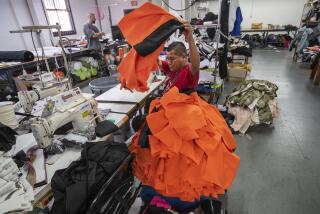Factory Orders Fall 2.5%, Most in 10 Months
- Share via
WASHINGTON — Orders to factories for manufactured goods fell a steep 2.5% in May, the sharpest drop in 10 months, the Commerce Department reported Friday, providing more evidence of a weakening economy caused by high interest rates.
The weak May factory orders appeared consistent with data showing slow growth in the manufacturing sector, which until recently had been a key factor in the economy’s expansion.
Orders for durable goods, big-ticket items expected to last more than three years, represented virtually all of the May decline. They were off 4.5% to $123.6 billion, even worse than a preliminary report last week that they had fallen 4.2%.
“The big decline indicates the economy is slowing more sharply than expected and underlines the Federal Reserve must actively move to lower interest rates,” said Jerry Jasinowski, chief economist for the National Assn. of Manufacturers.
“We’re at a point now where the slowdown may get away from us if the Fed doesn’t respond soon,” Jasinowski said.
The department reported the decline in orders for both durable and non-durable goods to a seasonally adjusted $234 billion in May was the steepest falloff since orders dropped 3.6% in July, 1988.
Until recently, interest rates had been rising as a result of the Fed’s efforts to restrain inflation by tightening credit. The downturn in factory orders in May reflected other reports recently of a slowing economy.
Most analysts believe that the Fed is steering the economy to a so-called soft landing, rather than a recession, and there already have been signs that it is easing its grip on credit.
“I don’t think that we’re heading for anything like a recession,” said Robert Brusca, chief financial economist for Nikko Securities International in New York. “I think we may have something like that coming our way by the end of next year, but not for the moment.”
Taking exception to the soft-landing theory was Bruce Steinberg of Merrill Lynch Capital Markets in New York who said “the one area of real strength has been the industrial sector and that’s really softening up.
“I think there will be a recession the second half of the year,” he said.
Pierre Ellis, senior economist for Boston Co. in New York, explained that interest rates are a big factor in durable goods purchasing decisions.
Ellis and other analysts said the slowdown could lead to more unemployment if manufacturers cut back production in the face of declining demand.
Transportation equipment fell 9.6% largely because of a big drop in commercial aircraft orders to lead May’s decline. Without the volatile transportation sector, durable goods orders would have been off only 1.2%.
Inflation Factor
Other drops in the durable area included primary metals, off 1.3%; non-electrical machinery, off 3.3%, and electrical machinery, off 5.8%.
Non-durable orders fell 0.1% to $110.4 billion.
Ellis said these orders “have seen substantial inflation during the last several months,” and the decline “may reflect an unwillingness of purchasers to pay higher prices.”
The May decrease, which followed a revised 3% gain in April, left the value of factory orders at a seasonally adjusted $233.95 billion. The May fall in orders was below Wall Street expectations for a 2% decline, and was the biggest drop since a 3.6% fall in July, 1988.
Shipments of manufactured goods fell 0.2% in May to a seasonally adjusted $233.5 billion, after a 2.6% increase in April.
More to Read
Inside the business of entertainment
The Wide Shot brings you news, analysis and insights on everything from streaming wars to production — and what it all means for the future.
You may occasionally receive promotional content from the Los Angeles Times.










